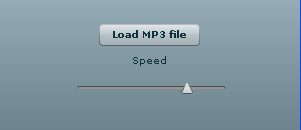A while back I did some experimenting with the new Flash 10 audio features. Since then I’ve received a couple of emails from people who have noticed that the flash player can freeze up when the mp3 file is initially extracted with the Sound.extract command – especially with longer mp3 files.
The solution is to simply extract only as much of the sound as you need to work with on each sampleData callback. However, this can get confusing when you combine it with the speed changing code from my first example. So I’ve put together another example which uses this method:
The code is available for download here or you can see it below:
{
import flash.events.Event;
import flash.events.SampleDataEvent;
import flash.media.Sound;
import flash.media.SoundChannel;
import flash.net.URLRequest;
import flash.utils.ByteArray;
/**
* @author Kelvin Luck
*/
public class MP3Player
{
public static const BYTES_PER_CALLBACK:int = 4096; // Should be >= 2048 && < = 8192
private var _playbackSpeed:Number = 1;
public function set playbackSpeed(value:Number):void
{
if (value < 0) {
throw new Error('Playback speed must be positive!');
}
_playbackSpeed = value;
}
private var _mp3:Sound;
private var _dynamicSound:Sound;
private var _channel:SoundChannel;
private var _phase:Number;
private var _numSamples:int;
public function MP3Player()
{
}
public function loadAndPlay(request:URLRequest):void
{
_mp3 = new Sound();
_mp3.addEventListener(Event.COMPLETE, mp3Complete);
_mp3.load(request);
}
public function playLoadedSound(s:Sound):void
{
_mp3 = s;
play();
}
public function stop():void
{
if (_dynamicSound) {
_dynamicSound.removeEventListener(SampleDataEvent.SAMPLE_DATA, onSampleData);
_channel.removeEventListener(Event.SOUND_COMPLETE, onSoundFinished);
_dynamicSound = null;
_channel = null;
}
}
private function mp3Complete(event:Event):void
{
play();
}
private function play():void
{
stop();
_dynamicSound = new Sound();
_dynamicSound.addEventListener(SampleDataEvent.SAMPLE_DATA, onSampleData);
_numSamples = int(_mp3.length * 44.1);
_phase = 0;
_channel = _dynamicSound.play();
_channel.addEventListener(Event.SOUND_COMPLETE, onSoundFinished);
}
private function onSoundFinished(event:Event):void
{
_channel.removeEventListener(Event.SOUND_COMPLETE, onSoundFinished);
_channel = _dynamicSound.play();
_channel.addEventListener(Event.SOUND_COMPLETE, onSoundFinished);
}
private function onSampleData( event:SampleDataEvent ):void
{
var l:Number;
var r:Number;
var p:int;
var loadedSamples:ByteArray = new ByteArray();
var startPosition:int = int(_phase);
_mp3.extract(loadedSamples, BYTES_PER_CALLBACK * _playbackSpeed, startPosition);
loadedSamples.position = 0;
while (loadedSamples.bytesAvailable > 0) {
p = int(_phase - startPosition) * 8;
if (p < loadedSamples.length - 8 && event.data.length <= BYTES_PER_CALLBACK * 8) {
loadedSamples.position = p;
l = loadedSamples.readFloat();
r = loadedSamples.readFloat();
event.data.writeFloat(l);
event.data.writeFloat(r);
} else {
loadedSamples.position = loadedSamples.length;
}
_phase += _playbackSpeed;
// loop
if (_phase >= _numSamples) {
_phase -= _numSamples;
break;
}
}
}
}
}
You can compare it to the code in the original post to see the changes I made.
One thing to note is that there is still a delay when you load an MP3 in my example. This is because I am using the same FileReference.browse > Sound object hack as last time and this needs to loop over the entire loaded mp3 file while turning it into a Sound object. This wouldn’t be an issue in most use-cases where you have loaded the sound through Sound.load.
I also removed the option of playing the sound backwards in this example as that would have added further complexity to the code and hurt my head even more!
